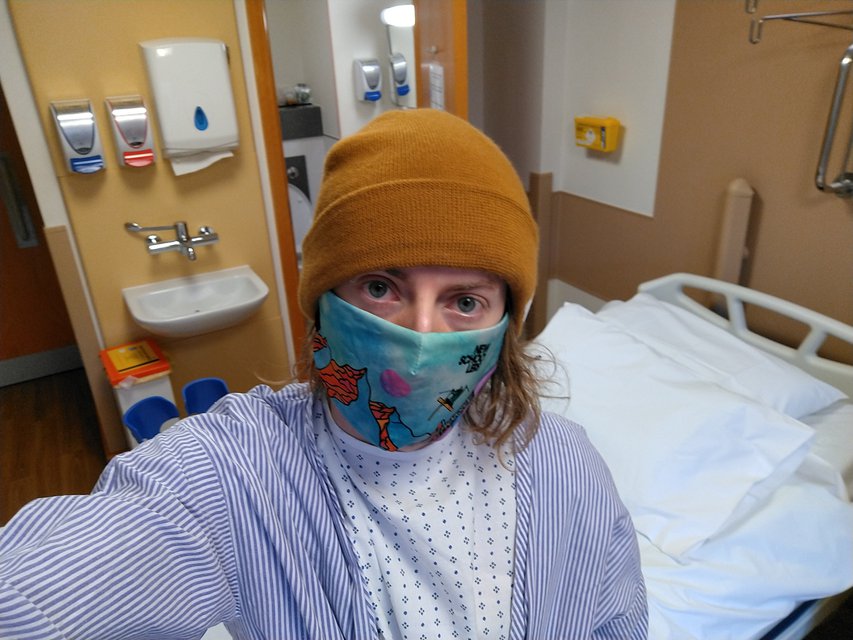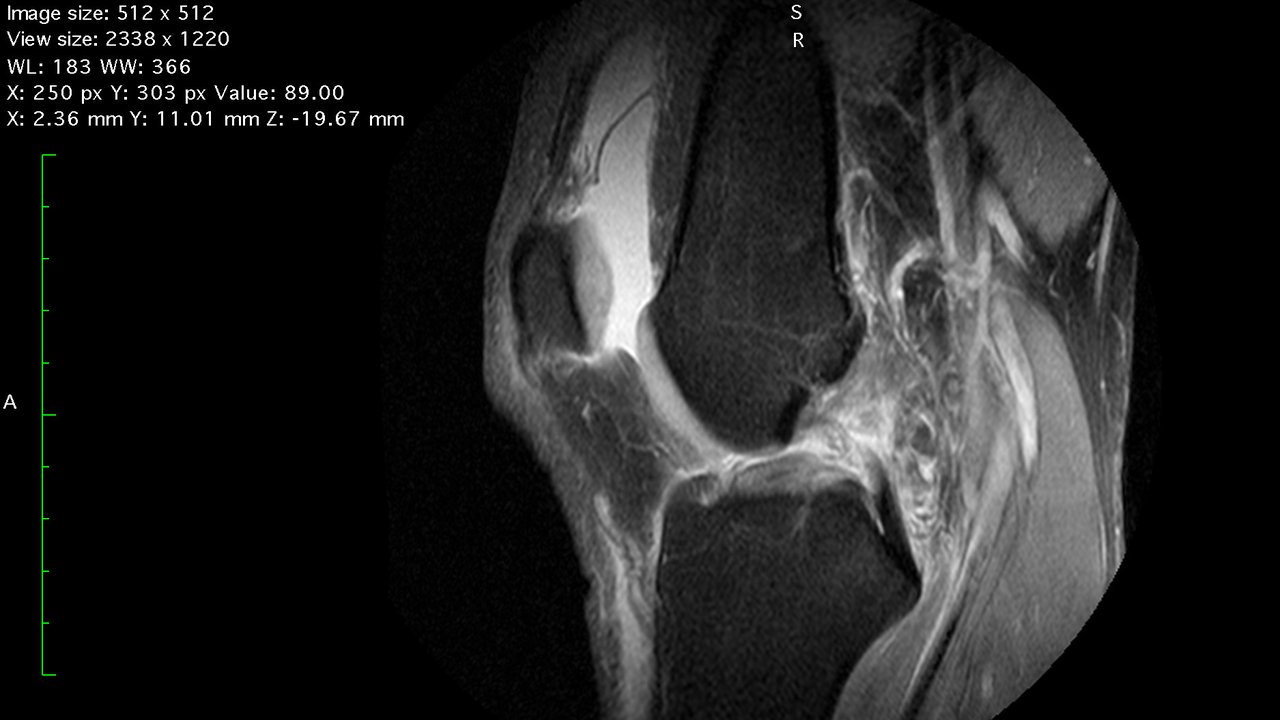Oh shi-. Twist. Pop. I didn’t have much time to register what was happening before it happened. A routine powder run. A small cliff drop. Stomped. And then turn, epic face shot, huge grin and repeat. I’d basically made it to the bottom of my run when something went wrong. Even as I write this, I still don’t know exactly what. I think I got thrown a little backseat, the tail of my right ski started giving way and suddenly I was tumbling. All I can really say is my ski didn’t release and I felt the dreaded pop. Should it have released? Probably. But if we’re honest with ourselves, we’re all rolling the dice with our DIN settings. “I’ve blown my knee”, I immediately called down to my friends waiting below. They couldn’t believe it, the crash looked like nothing.
I actually got myself up and skied down to them before patrol ultimately gave me a ride to the lift. The trip to the doctor a couple of hours later gave me false hope. “It’s only your MCL” I was initially told. I demanded an MRI (if you’ve hurt your knee, insist on getting one of these), and that gave me the true picture. But, in truth, I knew the results the second I felt the pop. Full ACL rupture, a thankfully partial MCL tear, and a meniscal tear on the lateral side (along with some other minor damage). December 2nd, season over. And so the ACL diaries begin. I always knew this would happen one day and having taken some time to steel myself before writing this, my idea here is to create a diary that the countless others among you can use as research for your own adventures with ligament damage. I have no medical training myself but come from a family of doctors and have a fairly privileged position in the ski industry when it comes to knowing who to ask for advice, meaning I had a big headstart with this. So I want to try and include some ‘pro tips’ along the way.
Vital early steps:
- Get an MRI. I said this earlier and it may cost money depending on your insurance/nationality, but do it. Get it within the first 72 hours if you can. Not being 100% sure of your diagnosis is crippling and you want to start making the next steps as fast as you can because it’s a long process.
- Do your research, but don’t overdo it! You’ve blown your knee and want to get it fixed quickly, by the best surgeon possible. I get it. I’m a textbook overthinker but it hasn’t helped that much. P-Rod's video series is a good watch.
- Make sure you line yourself up a physio well before the surgery. In fact, do it as soon as you can basically move around because you want to get cracking with pre-hab. The aims are to minimize muscle loss and even more importantly, get your full range of movement back before the operation. It's not a fun experience but it gives you something to do and you're really helping your chances of a smooth recovery (or so, I'm told).
Choosing your surgeon
There are a couple of things to consider but your best bet, the bet the majority of top professionals go with, is to find a good surgeon and get an ACL reconstruction. I had advice from some incredible sources: Doctors of Premiership football clubs, consultants to Red Bull’s athlete team, physios from the clinics that help the very best skiers in the Alps and of course lots of top skiers who’ve had the same done. The conclusion was always the same. The ‘regular’ ACL reconstruction operation from a surgeon who has a lot of experience with the procedure, combined with diligent adherence to a hardcore recovery program of physio is the best way back to your previous level of any sport.
It’s worth mentioning here that there are various alternative ACL repair options that promise much. Internal Brace, BEAR, and Ligamys Dynamic Intraligamentary Stabilization all promise the holy grail of ligament repair, rather than reconstruction. These processes are out there and there are some promising early results (albeit mostly published and promoted by those who offer said surgical options). I initially looked into all of these but when I reached out for advice from the aforementioned people, who see 1000s of ACL cases in their careers, none thought any of the alternative options are close to replacing the reconstruction at this point. That day may well come, but today, if you want the best odds of returning to full performance as soon as possible, those procedures are probably not your optimal choice.
a) There is insufficient clinical evidence to suggest any of these options is as successful, let alone more successful than ‘traditional’ ligament graft reconstruction at this point in time.
b) The trainers, coaches, and physios I talked to suggested that when athletes do opt for these operations they don’t provide faster recovery in reality. All told me they see a significantly above average occurrence of reinjury with all of the repair options.
Spend your time finding a surgeon and doing prehab instead. There are some gold standard surgeons out there, but the advice I was given by doctors and physios who were purely helping me out without compensation, is that as long as someone does a lot of these (100+ per year was the number I was given), they will do a good job. See who has time to operate at the ideal time for your recovery, see who you feel good working with, and go for it. Again, you can (and I did) easily overthink this.
There are differing opinions on which graft is best, and more specifically, which is best for skiers. I’ve spoken to pros who have had all of the major options (Hamstring, Patella Ligament, Quadriceps tendon, and allograft). I’ve heard success stories of all of them, and failures too. The basic breakdown seems to be that the simplest operation and the one that works best for the majority of cases is the hamstring graft. There are suggestions that both the quadriceps tendon and the patella tendon can be slightly stronger grafts, offering slightly lower recurrence rates. However, what I was told was that the quadriceps tendon requires more complicated pre-graft preparation and is generally a more fiddly operation, while the patella tendon leaves you more open to patella injuries, knee pain, difficulty kneeling, and potentially, longer recovery times. The allograft has a significantly higher recurrence rate, though whether that is simply because it takes longer for your body to accept it despite feeling good, and therefore people rush back before they are properly healed, is not entirely known.
Dealing with it
Ultimately, the first thing you need to accept is that this is way harder mentally than it is physically. And I can’t say with any confidence that I’ve got there. The pain from an ACL tear is minimal, but feeling the future stretching out in front of you without being able to do the things you love is really tough. It gets harder too when the knee returns to feeling ok within a couple of weeks, you feel like you’re healing but you know you aren’t. You know that you are going to send yourself back to the immobile state, you are going to choose a long painful recovery when right now, you feel alright.
I haven’t exactly handled it brilliantly. I know I’ve been irrationally emotional, lashing out at those trying to help me, feeling jealousy and resentment as they do their best. But I also know that, to some degree, it’s natural. Of course, there are millions upon millions of people in the world going through worse, and of course, some people probably deal with this fine, but it actually does also suck.
On any given day I’ve been doing cycles of thoughts including:
- Denial (Are they really sure? My knee feels fine)
- Hopelessness (What is even the point of getting the surgery? I’m just going to re-injure myself anyway)
- Self-pity (no-one cares and I’m alone in this)
- Anger (fuck this, I’m just going to ski anyway)
And that’s just the internal stuff. All you can do is try the best you can to stay positive. Do your physio. Take some solace in the good bits of your day. Talk to people. When you fuck up, own it, and apologize. And get help if you need it, be it from family, friends, or professionals. I was certainly awful to deal with at times, so though I doubt they'll read this, I wanted to say a huge thank you to everyone who helped with this. You know who you are.
It's a long road and my plan is to document it as best as I can in case it helps someone out who is in the same position. Today (11th Jan) is my surgery day, so if you’re reading this within a few hours of publishing, I’m in theatre right now. Fingers crossed it all goes well and see you on the other side. I’m sure tons of you have experience with ACL injuries, so drop your tips and pointers in the comments below.



Comments